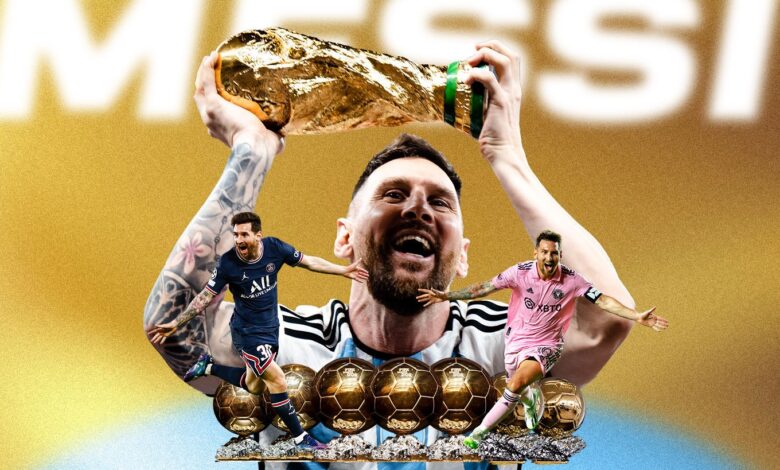Why Lionel Messi Is the Favourite to Win the Ballon D’Or

The 2023 Ballon d’Or will be awarded on Monday, and Lionel Messi is expected to scoop football’s most coveted individual prize for a record-extending eighth time.
Lionel Messi had one trophy missing from his vast collection. Some observers (or staunch supporters of Cristiano Ronaldo with an axe to grind) claimed that unless the Barcelona legend managed to claim this final prize, how could he ever be truly considered to be the GOAT?
So, Messi did what Messi does – though what he hadn’t managed to do in his four previous FIFA World Cup appearances – he won.
Not only did Messi win, but he did it in style, dragging an Argentina side that, while blessed with quality, was by no means the best squad in the tournament, all the way to glory in Qatar.

At Lusail Stadium last December, Messi finally lifted the trophy that had eluded him. His performances in Qatar echoed those of the late, great Diego Maradona back in 1986, when he too hauled an Argentina team into the history books in Mexico.
And a year after missing out on the shortlist for the 2022 Ballon d’Or, Messi is now the favourite to claim this year’s accolade, which will take into account performances from the 2022-23 season. It would be his eighth, extending the record he holds.
Yes, Manchester City sensation Erling Haaland starred in his first season in England, setting a new Premier League goalscoring record for a single season while netting an incredible 52 times as Pep Guardiola’s team won the Premier League, FA Cup and UEFA Champions League treble.
Yes, Rodri played a pivotal role in all that Man City success, including scoring the winner in the Champions League final.
Yes, Kylian Mbappé continued to thrive, playing a direct part in 50 goals in all competitions for PSG.
Yes, Jude Bellingham flourished at Borussia Dortmund to get his big move to Real Madrid, where he has already reached superstar status.
But none of them should be taking this edition of the Ballon d’Or above Messi. Here, we explain why he is the favourite to be named the world’s best player once again.
A Crowning Moment
Messi scored seven goals and assisted a further three across Argentina’s seven matches in Qatar. Those 10 goals made up two-thirds of Argentina’s total (15). He is one of six players with at least 10 goal involvements at a single World Cup since assists were first tracked – Eusebio (10, 1966), Pele (10, 1970), Maradona (10, 1986), Mbappé (10, 2022) and Gerd Muller (13, 1970) are the other players on that star-studded list. Just Fontaine (13 goals, 1958) and Sándor Kocsis (11 goals, 1954) also hit 10+ goal involvements prior to assists were tracked purely through their strikes alone.
Messi was the first player in the history of FIFA’s flagship tournament to score in the group stage, last 16, quarter-finals, semi-finals and final (he had previously never scored a knockout goal at a World Cup, despite playing 756 minutes of knockout football at the tournament and attempting 23 shots), while he is one of only five players – along with Jairzinho, Just Fontaine, Salvatore Schillaci and Davor Suker – to have scored in six matches at one edition of the finals.
At 35, Messi led the 2022 World Cup for shots (32), shots on target (18), chances created from open play (17), fouls won (22), and overall xG (6.63), though it is worth noting that he converted four penalties. His open play xG was 2.69, third highest behind France strikers Mbappé (3.62) and Olivier Giroud (3.49).
He also was involved in more open-play sequences leading to a shot than any other player in the competition, with his 53 four more than second-best Mbappé, and was level with Antoine Griezmann for big chances created (seven). Mbappé, meanwhile, was the only player to have more touches in the opposition area than Messi (68 to 45).

Messi became the player with the most appearances in World Cup history (26), overtaking Germany great Lothar Matthäus (25), while in the 23rd minute of the final, he overtook Paolo Maldini’s record tally of minutes played at the tournament finals (2,216).
His two goals in the final saw him move to 13 goals at the finals, putting him third on the all-time list, behind Brazil’s Ronaldo (15) and Germany’s Miroslav Klose (16). Messi is one of four players, along with Klose, Pele and Uwe Seeler, to have netted at four different World Cups, with only Cristiano Ronaldo (five) managing to score at more finals.

As well as winning the main prize, Messi was also given the Golden Ball for his performances. Mbappé, arguably his main rival for this year’s Ballon d’Or, finished as the tournament’s top scorer, winning the Golden Boot, having netted a hat-trick in the final, but it was still Messi’s day, and arguably the best individual display at a World Cup.
When it comes to all-time data, Messi is now the World Cup leader for chances created (75), chances created from open play (55), dribbles attempted (206), dribbles completed (125), shots (104) and shots on target (46).

It was a hell of a tournament for the then-Paris Saint-Germain player, and that alone should be enough to see him get the award.
But, it wasn’t just the World Cup in which he shone last season…
Undervalued at PSG?
Heading into last year’s World Cup, Messi had been playing brilliantly for PSG.
Prior to the mid-season tournament, nobody across the top five European leagues had been more of a threat than Messi, who averaged 1.2 expected goal involvements per 90 minutes from non-penalty situations. Essentially, he was getting into scoring positions and creating high-value opportunities for his club-mates.
Across the top five European leagues, Messi had the most assists in all competitions (14, with 10 of those coming in Ligue 1) prior to the World Cup break; he had already equalled his entire tally of assists from the 2021-22 season, despite playing 1,290 fewer minutes, and he had already overtaken his goal tally from the previous campaign (12 compared to 11). There was certainly a feeling Messi was gearing up for one last run at World Cup glory.

In the 18 matches he played in for PSG in the lead-up to the World Cup, Messi was averaging 83 touches, (6.38 of which were in the opposition’s box), 1.44 goal involvements, 2.81 chances created, 0.98 big chances created, 4.25 shots and 3.22 successful dribbles per 90 minutes. Those are incredible numbers, even if they did drop slightly after the World Cup in Messi’s subsequent 22 matches for PSG in all competitions.
Messi’s time at PSG might have seen the French side win Ligue 1 in both of his campaigns at the Parc des Princes, but it did not yield the Champions League success that QSI so crave. It also ended on a sour note, when Messi was reprimanded for an unauthorised visit to Saudi Arabia, which resulted in some sections of the PSG support protesting against him and demanding he leave the club.
For the world’s greatest player to be treated with such contempt is a huge shame, even if it had never quite fully clicked well enough with Mbappe and Neymar to inspire PSG to that long-coveted European success.
The numbers from last season go against the narrative that he failed at PSG, though. Only four players in Europe’s top five leagues (Haaland – 61, Mbappe – 50, Mohamed Salah – 46 and Vinicius Junior – 42) played a part in more goals than Messi last term (41). He scored 21 goals – with none of them coming from the penalty spot – and assisted a further 20, a figure bettered only by Man City star Kevin De Bruyne (28).
Interestingly, while De Bruyne overperformed his expected assists (xA) of 19.24 by 8.76, Messi accumulated 18.7 xA for his 20 assists. That suggests his assist total did not rely too heavily on better-than-expected finishing from his PSG teammates, while De Bruyne clearly benefitted from having the clinical Haaland finish off some of his tougher chances.

Messi created 88 chances from open play, the fourth-most in Europe’s top five leagues, after De Bruyne (99), Vinicius (103) and Manchester United’s Bruno Fernandes (146), while he was third for big chances created, with 34 – 10 fewer than De Bruyne and 14 fewer than Fernandes. Real Madrid winger Vinicius (196), meanwhile, was the only player to better Messi’s total of completed dribbles (126).
Indeed, Messi’s performance in the 2022-23 Ligue 1 season ranked near the best among all forwards in possession and attacking in the top five European leagues in the last 15 seasons, ranking him in the 100th percentile for both chances created and touches.
Over the hill? Hardly.
Across the Pond
With all the rigmarole following his trip to Saudi Arabia, the chances of Messi staying at PSG always seemed slim, and so it proved.
Al Hilal, who eventually settled for Messi’s good friend Neymar, offered the Argentine a huge contract to head to Riyadh, and with a return to La Liga champions Barça off the cards due to his old club’s financial restrictions, his heart was set on another destination: South Florida.
Inter Miami had long been linked with Messi, and in early June, not long before he turned 36, the forward confirmed he would be heading across the Atlantic and to MLS.
In the biggest incoming transfer to that league since David Beckham joined the LA Galaxy in 2003, Messi mania took over.
Miami fans had to wait until mid-July for Messi to make his bow, which came as a substitute in the Leagues Cup against Liga MX side Cruz Azul.
It was a Hollywood debut: Messi stepped up to curl in a stoppage-time free-kick to lift Gerardo Martino’s team to a 2-1 victory – it was the second time in his career that he had scored a direct free-kick winner in added time (after such a goal in February for PSG against Lille).

Two goals followed against Atlanta United – the 100th different club Messi had found the net against in his illustrious career. Both of his goals in that game were scored with his right foot; it was the first time he had scored two right-footed goals in a match since February 2015.
Given the Ballon d’Or only accounts for performances up to the end of July, Messi’s following achievement of dragging a Miami team that had been winless in 11 MLS matches prior to Leagues Cup glory will not be in consideration, as well as the US Open Cup final, though his impact at the club has been remarkable.
Injury limited Messi’s minutes – and dashed Miami’s chances of sneaking into the MLS Cup playoffs or winning the US Open Cup – in the final stages of the regular season, but he finished the campaign with 11 goals and five assists in all competitions, from just 14 appearances.
While he enjoys his swansong in the United States, Messi’s achievements last season – his wonderful performances in Qatar and the staggering numbers he put up while at PSG – should be enough to see him claim a much-deserved eighth Ballon d’Or.




